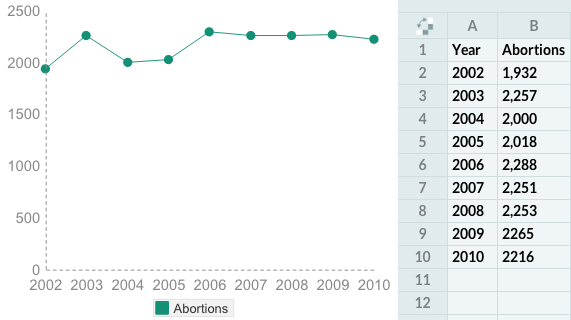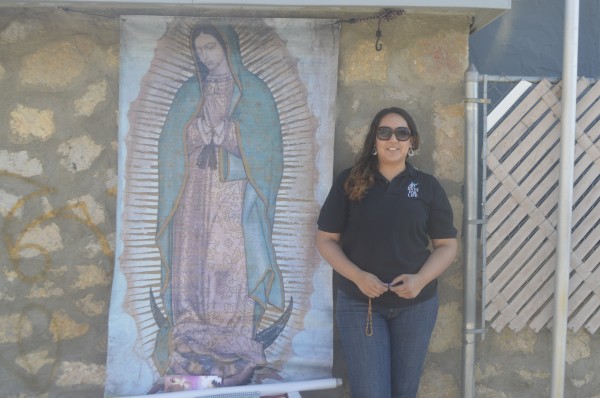While most people might not remember the date October 21, 2011, it is eternally engraved into Mimi’s mind. She was 18, scared, and pregnant.
She was lying down in a room inside one of El Paso’s abortion clinics, her heart beating through her skin. Two nurses entered the room and poured a cold blue gel on her stomach to do a sonogram.
After the nurses left, the room seemed to enlarge. Mimi stared at the bare white walls that surrounded her. She could feel her fear reflected in those dull walls, her heart racing, her fingers shacking. By carefully controlling the muscles of her face, she said she did not betray any fear.
“I was about to go through something that’s not normal,” recalled Mimi, now 22 and a junior at the University of Texas at El Paso.
At some point between the nurses and the anesthesia her facial muscles aligned themselves with her thoughts and tears began streaming down her face.
“You don’t have to do the abortion if you don’t want to,” the nurses told Mimi.
If she didn’t have the abortion Mimi would get kicked out of her house, have to drop out of school to take care of the baby and get married to someone she didn’t love.
Mimi wasn’t alone that day; she made a decision many women make.
According to the Guttmacher Institute, a non-profit dedicated to advancing reproductive rights, at least 1.2 million women have abortions in the United States each year. By the age of 20, one in seven women has undergone an abortion. By the age of 45 at least one in three women has had an abortion. In 2011 there were 73,200 abortions in the state of Texas.
Data from the Texas Department of State Health Services reveals that in 2010 there were 2,216 abortions in El Paso County, one of the highest teen pregnancy rates in the state. According to data from the Texas Department of Public Health in Texas there is a rate of 65 pregnant teens per 1,000 teens, while in El Paso there are 80 per 1,000. The Guttmacher institute says the national rate is 57.4 pregnancies per 1,000 women ages 15-19.

Many abortion clinics in Texas closed after Texas House Bill 2 known as the Pro-life Omnibus Bill was signed into law on July 18, 2013 by governor Rick Perry in a special session after it was filibustered for 13 hours by Democratic gubernatorial candidate and Texas Senator Wendy Davis.
Texas H.B. 2 imposed some of the toughest restrictions on abortions in the nation. Among the requirements imposed by the law: Abortions are illegal after 20 weeks of conception; doctors performing abortions need hospital admitting privileges within 30 miles of a hospital; and abortion clinics have to meet the infrastructure requirements of an ambulatory surgical center.
Before the law went into effect, there were 44 abortion clinics in Texas, now there are less than 20.
In June, the law caused Reproductive Services, one of two El Paso abortion clinics, to shut down after it could not meet some of the requirements of the law. “It is our hope that we can reopen. It is something that we are working on right now,” said Gerri Laster, an administrator at Reproductive Services.
A recent Supreme Court decision blocked the ambulatory requirements of the law and it exempted providers in El Paso and McAllen from having to meet the hospital admitting requirements of the law.
If it hadn’t been for the Supreme Court ruling,only eight clinics in Texas would remain and none in El Paso or McAllen.
The ambulatory requirements portion of the law that was set to take place Sep. 1 and had been temporarily delayed after Judge Lee Yeakel of the United States District Court ruled the law unconstitutional in Austin, Tex.
However, a hearing by the Fifth Circuit Federal Appeals Court in New Orleans had reinstated the overturned portions of the law.
Pro-Choice affiliates argued that reducing access to abortion clinics would cause women to seek unsafe procedures.
Drew Stanley, Social Media and Innovation Manager for Whole Women’s Health told Borderzine: “Their (women in the RGV) only other option is to go to Mexico. That means they will buy an abortion pill in the flea market or seek an unsafe service.”
According to Lester, self-induced abortion through the pill could be very dangerous not only to women in the states but in Mexico as well.
There are two pills women can get for an abortion. They are Mifepristone (also known as the abortion pill, RU 486, Mifegyn, Mifeprex), and Misoprostol (also known as Cytotec, Arthrotec, Oxaprost, Cyprostol, Mibetec, Prostokos or Misotrol).
“They would be seeking to use the pill in ways its not supposed to be used. There’s going to be bleeding…and vice-versa for the women in Mexico. It’s going to be unsafe for them,” Lester said.
However, proponents of the law said it’s meant to help increase safety for women seeking abortions.

Gabriela Frederico, campaign director for 40 days for Life stands outside of Hilltop Reproductive Services. Photo credit: Maria Esquinca
Emily Horne, Legislative Assistant at Texas Rights for Life, a statewide pro-life organization in Texas that lobbied for Texas H.B. 2, said: “Higher surgical centers and higher doctor credentials will benefit women.”
But Lester said abortion clinics are already heavily regulated for safety.
“There hasn’t been an active death in Texas since 1976,” said Lester. “We’re regulated by the Department of Health and Safety. We’re regulated by CLIA (Clinical Laboratory Improvements Amendment). We’re constantly looked at by the feds.”
Whole Women’s Health announced it would be opening a clinic in Las Cruces on September 15 that will help provide access to abortions to women from New Mexico as well as El Paso and Ciudad Juarez.
Mimi says she doesn’t know what she would have done when she sought her abortion in 2011 if the closest clinic had been far from El Paso. “I probably would’ve packed all my stuff and just left home and had the kid.”
Mimi said her life would’ve been completely different.
